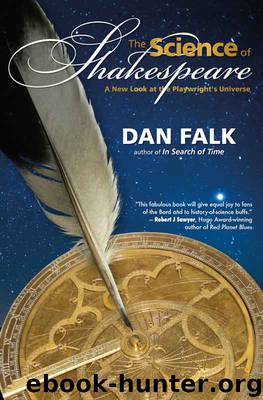The Science of Shakespeare by Dan Falk

Author:Dan Falk
Language: eng
Format: epub, mobi
Publisher: Goose Lane Editions
WHEN SHALL WE 1,250 MEET AGAIN?
The Shakespeare Association of America is to Shakespeare studies what the American Astronomical Society is to astronomy. The SAA* is the world’s largest professional association for Shakespeare scholarship and allied studies, boasting some 1,250 members from 36 countries. I had the privilege of sitting in on a number of sessions at their annual conference in 2012, when it was held in Boston, and again in 2013, when it was held in Toronto. The breadth of topics tackled at a typical SAA conference is truly staggering, encompassing not only Shakespeare’s writings but also those of Marlowe, Jonson, and any other writers active in early modern England, as well as analyses of the rapidly changing material, social, and intellectual environment in which these writers lived and worked.
Scholars come to present their papers, listen to other scholars’ papers, and to discuss research areas of mutual interest. That much it probably has in common with any other arts or humanities conference. But one difference stood out: In each seminar room, some fifteen or twenty chairs are placed around a central table, as in a corporate boardroom; people actually presenting a paper in the session are invited to sit in this “inner circle.” Surrounding them one finds another thirty or forty chairs lined up against the outer perimeter of the room, facing inward. This is where the “auditors” sit—anyone who’s not presenting a paper. (These are often graduate students, but they’re just as likely to be tenured professors who are attending the session to listen rather than to present.) This arrangement, which one senses hasn’t changed in many, many years, is clearly seen as normal by the attendees—but it seems to create an unnecessarily harsh divide between the presenters and the auditors. (The view from the auditors’ circle is a bit odd, as one peers at the faces of half of the presenters, and the backs of the heads of the other half. Even when you can see a speaker’s face, it is always partially obscured by the back of someone else’s head.)
Topics that came up for discussion in 2012 and 2013 ranged from the predictable to the esoteric. A seminar titled “Reading Shakespeare and the Bible” is hardly surprising; in the twenty-first century, neither is “Early Modern Queer Colonial Encounters” or “iShakespeare: New Media in Research and Pedagogy.” For myself, on the lookout for science-related topics, a panel on “‘The Famous Ape’: Shakespeare and Primatology” was a highlight of the 2012 conference; so was a seminar on “Matter, Perception, and Cognition in the Renaissance.” (I tried not to worry too much when a seminar leader referred to philosopher and cognitive scientist Daniel Dennett as “David Dennett”; I suppose anyone can make a one-time slip.) Sometimes what seem like minor things become major discussion topics: The question of how many people have to be able to see a dagger before it should be considered “real”; how sleep deprivation affects Macbeth’s cognitive abilities; whether the names of Shakespeare’s characters have scatalogical significance, reflecting (as one scholar suggested) “aspects of anality and flatulence.
Download
This site does not store any files on its server. We only index and link to content provided by other sites. Please contact the content providers to delete copyright contents if any and email us, we'll remove relevant links or contents immediately.
| Ancient & Classical | Arthurian Romance |
| Beat Generation | Feminist |
| Gothic & Romantic | LGBT |
| Medieval | Modern |
| Modernism | Postmodernism |
| Renaissance | Shakespeare |
| Surrealism | Victorian |
4 3 2 1: A Novel by Paul Auster(12368)
The handmaid's tale by Margaret Atwood(7752)
Giovanni's Room by James Baldwin(7320)
Asking the Right Questions: A Guide to Critical Thinking by M. Neil Browne & Stuart M. Keeley(5755)
Big Magic: Creative Living Beyond Fear by Elizabeth Gilbert(5753)
Ego Is the Enemy by Ryan Holiday(5412)
The Body: A Guide for Occupants by Bill Bryson(5078)
On Writing A Memoir of the Craft by Stephen King(4925)
Ken Follett - World without end by Ken Follett(4720)
Adulting by Kelly Williams Brown(4564)
Bluets by Maggie Nelson(4544)
Eat That Frog! by Brian Tracy(4519)
Guilty Pleasures by Laurell K Hamilton(4438)
The Poetry of Pablo Neruda by Pablo Neruda(4092)
Alive: The Story of the Andes Survivors by Piers Paul Read(4017)
White Noise - A Novel by Don DeLillo(4001)
Fingerprints of the Gods by Graham Hancock(3986)
The Book of Joy by Dalai Lama(3972)
The Bookshop by Penelope Fitzgerald(3843)
